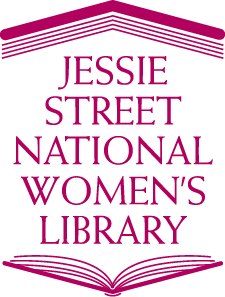History of the Library

Launch of Jessie Street: A Revised Autobiography in the Lower Town Hall in Sydney, March 2004. Left to right: Maxine McKew (guest speaker), Lenore Coltheart (who revised the autobiography), Shirley Jones (MC) and The Hon Elizabeth Evatt AC (at the microphone). Elizabeth Evatt launched the book.
“I would like to send this message of congratulations to everyone who has been involved in the establishment of the Jessie Street National Women’s Library, to those who dreamed of having such a library, to those who put in endless hours of work to make that vision a reality.” The Hon Elizabeth Evatt AC, Library patron, on the occasion of the launch of the Library in Sydney Town Hall House.
The idea of establishing a women’s library, conceived by Shirley Jones and Lenore Coltheart, was born of frustration with the difficulty of finding and accessing material on women in Australia. The first Annual General Meeting of the Jessie Street Women’s Library Association was held in August 1989. Virginia Blain was the first chairwoman. Sir Laurence Street, Jessie’s son, agreed to be a Library patron and was later joined by The Hon Elizabeth Evatt and poets, Judith Wright and Oodgeroo Noonuccal (formerly Kath Walker). In March 1990 the Library was incorporated and became a registered charity with tax-deductible status. Its objectives were to heighten awareness of women’s issues; to preserve documents on women’s lives and activities; to support the field of women’s history and to highlight women’s contribution to this country’s development.
Core Collection
The core collection of 500 books came from the estate of the feminist Eva Maria. Later donations have come from a range of sources such as women’s organisations, women moving into retirement villages, women academics and publishers. In 1993 the Canberra Women’s Archive, which documented two decades of the history of the women’s movement in Canberra, was donated. Other smaller collections followed. A grant from the State government in the late 1990s enabled the Library to employ an archivist part time. The Library has been housed in various locations. The City of Sydney is supporting our current location at the Ultimo Community Centre on the corner of Harris and William Henry Streets, Ultimo. The Library was relocated to this site in October 2005. All members are grateful to the City of Sydney for its ongoing support.
Running the Library
Fundraising has been a necessity. The income from talks and a prestigious luncheon, first held in NSW Parliament House in 1995 and now an annual event, meets daily running expenses. Grants from various organisations have helped maintain the archives. A number of small groups were set up outside Sydney. In 1996, the first of many Queensland functions for the Library was held in Brisbane. In March 2003, the first lunch hour talk organised by a group in Canberra was given. In 2012, there are about 50 volunteers contributing in total about 400 hours a week, or 20,000 hours a year. In monetary terms this is equal to an annual contribution of at least $300,000. Volunteers, many of them professional librarians, have kept the Library running and other volunteers give their time to help with administrative tasks in the Library as well as functions and other activities. In June 2000, the Library launched its website. The Library also has a Facebook page, YouTube site and Instagram page.
Projects
The Library is committed to ensuring that the contribution of ordinary Australian women is recognised. The Tapestry Project encourages women to write their own stories or those of their mother, grandmother or friend. The Oral History Project employs special volunteers to interview women from various cultural backgrounds. All these stories are important social histories of the contribution of women. The Library has expanded the Oral History Project to include the lives of Aboriginal women. Euphemia Bostock is the first Aboriginal woman to be interviewed for this project. She is a successful artist, a political activist and the founder of Boomalli Aboriginal Artists Cooperative in Sydney. Euphemia’s story can be found in the February 2012 newsletter. In 2007, the Library’s first DVD arising from the Oral History Project, More than Boat People -the Vietnamese Migration Experience through Women’s Eyes, was launched.
Exhibitions
Remembering Pine Gap
In September 2009, the Library curated an exhibition at Parliament House, titled Remembering Pine Gap, about the Women’s Peace Camp which was organised by Women for Survival in November 1983. The exhibition included photographs, posters, banners and memorabilia from that time, all of which are now part of the Library’s collection.
International Women’s Day Centenary
In March 2011, the Library curated an exhibition at Parliament House to celebrate the Centenary of International Women’s Day (IWD). The exhibition showcased how women have embraced IWD in the last 100 years. The Library’s NSW IWD posters were on display along with other materials from the collection.
Skirting Sydney: Putting Women’s History on the Map
In January 2010, the City of Sydney History Program, in collaboration with the Library, produced a brochure, ‘Skirting Sydney: Putting Women’s History on the Map’, a historical walking tour of the city. The map pinpoints key sites where girls and women lived and worked; where they were educated and entertained; where pioneering activist women held meetings, published journals and sometimes changed the possibilities for all women’s lives in the process. The Library is one of the sites on the tour as well as Jessie Street’s former office and her statue in the Jessie Street Memorial Garden, Loftus Street, Circular Quay.
Damned Whores and God’s Police – 40 Years On Conference
The Damned Whores and God’s Police Conference was held from 21 to 23 September 2015. The Library provided items from the collection for display at the Conference including the serial Mejane and posters. They were greatly appreciated. Anne Summers and Jenna Price sent a wonderful thank you letter to the Library which also details what arose from the Conference. The letter is attached. Thank You From Anne Summers and Jenna Price

